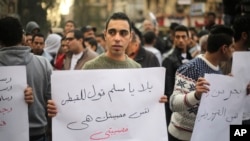The group that calls itself the Islamic State (IS) can’t abide competition even from the mute remains of its region’s fabled past.
An equal opportunity destroyer, IS has gone beyond lopping off the heads of live perceived enemies to demolishing priceless artifacts from ancient Mesopotamia that had survived previous waves of conquest.
The group’s extreme brutality and flare for publicity account in part for its appeal to disaffected Muslims, particularly in Europe.
A case in point is “Jihadi John,” a Kuwaiti-born Englishman who has been identified as the masked executioner in IS videos of murdered Western hostages, including Americans.
But the extreme intolerance of IS for other cultures and faiths ultimately will bring its downfall. Rejecting the teachings of Islam, IS zealots have gone on a medieval rampage against minority groups, most recently Assyrian Christians in northeast Syria.
IS fighters have kidnapped nearly 300 Christians – including about 30 women and children -- near the city of Qamishli. Judging from the grim experience of previous victims from the Yezidi sect, the men can expect forced conversion or execution and the women sexual slavery.
This sort of behavior has led even al-Qaida to reject IS and diminished its appeal for Sunni Muslims who oppose the regime of Bashar al-Assad in Damascus and the Shiite-dominated government in Baghdad.
Life under IS rule in cities such as Mosul – where the militants recently took sledgehammers to winged lions from the Assyrian Empire and other artifacts in the famed Mosul Museum – is becoming increasingly miserable.
According to Director of National Intelligence James Clapper, who testified Thursday on Capitol Hill, there is growing resistance to the group’s harsh interpretation of Islamic law and discontent with its poor governance.
The extremists who last June captured Mosul, Iraq’s second largest city, and declared it part of their “caliphate,” “don’t have the financial wherewithal to run a city” and are facing shortages of electricity, food and refined fuel, he said, in part because of U.S.-led airstrikes on IS refineries and supply routes.
While Clapper estimated the strength of the group at between 20,000 to 32,000 fighters, the fact that they come from a multitude of different countries is another potential Achilles heel.
A European analyst of the group, who spoke to VOA on condition of anonymity, predicted that the Nusra Front – the official al-Qaida affiliate in Syria – would defeat IS and stand as the main alternative there to the Assad regime because Nusra, unlike IS, is “90 percent Syrian.” There are fights between nationalities in IS and resentment of its leadership, the analyst said.
Clapper said IS also faces growing rates of desertion because of airstrikes and recent military defeats such as in the Syrian Kurdish city of Kobani, where he said the group lost 3,000 fighters primarily due to attrition.
The death toll was also high. The Syrian Observatory for Human Rights said 70 percent of the 1,800 people killed in the fighting in Kobani were on the side of IS.
Such losses are forcing IS to resort to increasingly coercive measures to conscript local forces. These include abducting children and giving them military training – hardly the sort of tactic that will win the hearts and minds of their parents.
The need for more cannon fodder also accounts for stepped-up efforts to recruit foreigners, using sophisticated social media.
European governments are responding by trying to identify vulnerable youth before they go and to lure them back as soon as possible if they make it to Syria or Iraq.
Jacob Bundesgaard, mayor of Denmark’s second largest city, Aarhus, told a Washington audience recently that an innovative program there achieved some success through intensive mentoring of returnees.
“In Denmark, most solutions to any problems involve assigning mentors,” Bundesgaard said, “very special people” who can appeal to youths that otherwise distrust authority. The program also instructs parents how to communicate with children who have gone to join what they see as a great and legitimate adventure.
Fathers are instructed not to order their sons to return but to try to reconnect with them emotionally. Mothers are often more useful in such appeals, Bundesgaard said, because they are “one of the things that will still melt their [fighters’] hearts.”
Ultimately, defeating IS will require a combination of measures including military action, multinational diplomacy to provide political solutions to sectarian conflict in Syria and Iraq, law enforcement to catch would-be terrorists and social programs to better integrate disaffected Muslim youth.
But there is no doubt about the outcome of the struggle: IS will fade into history and probably rate barely a footnote in the long and often bloody history of the Middle East.
The views and opinions expressed are those of the author and do not necessarily reflect the position of Voice of America.









